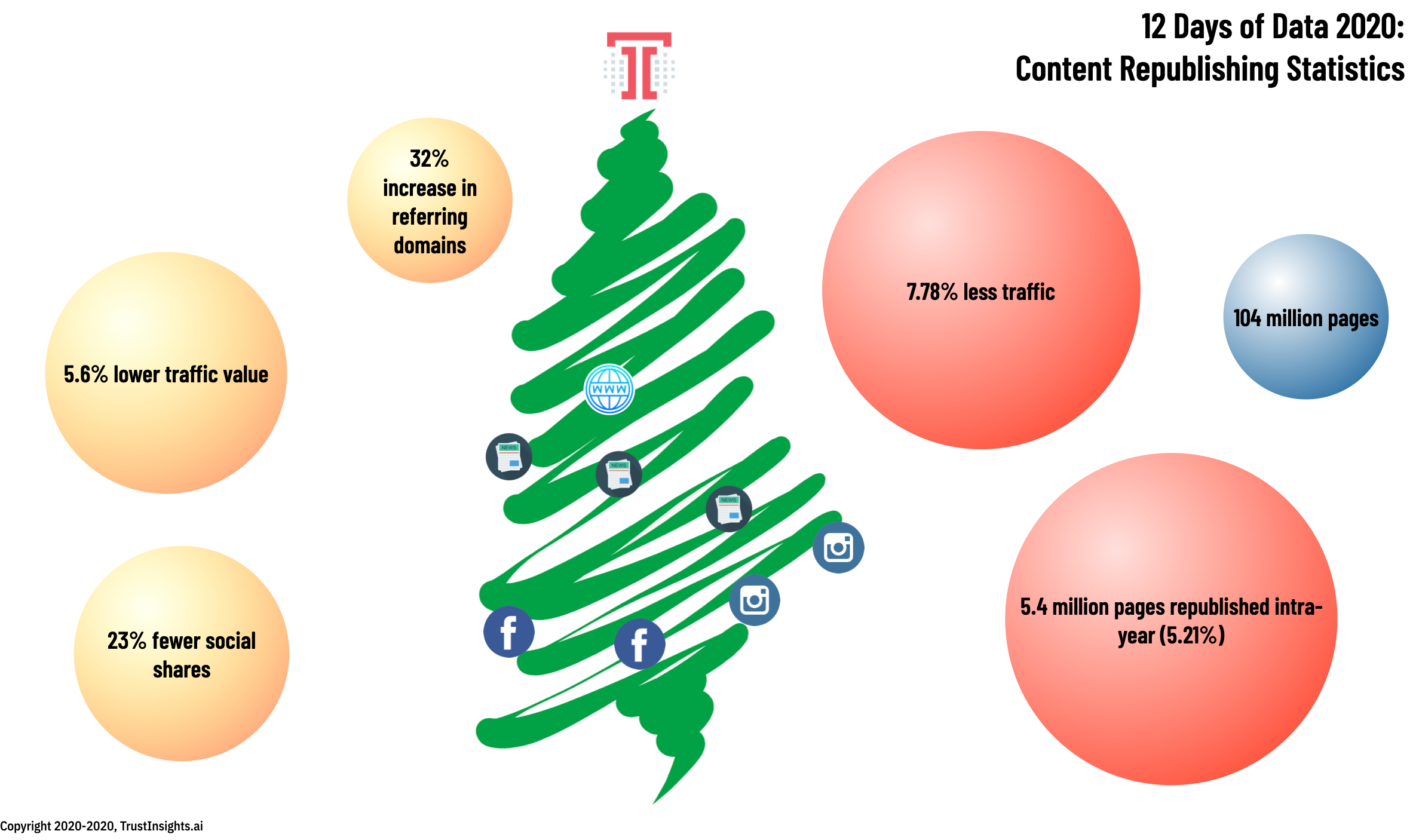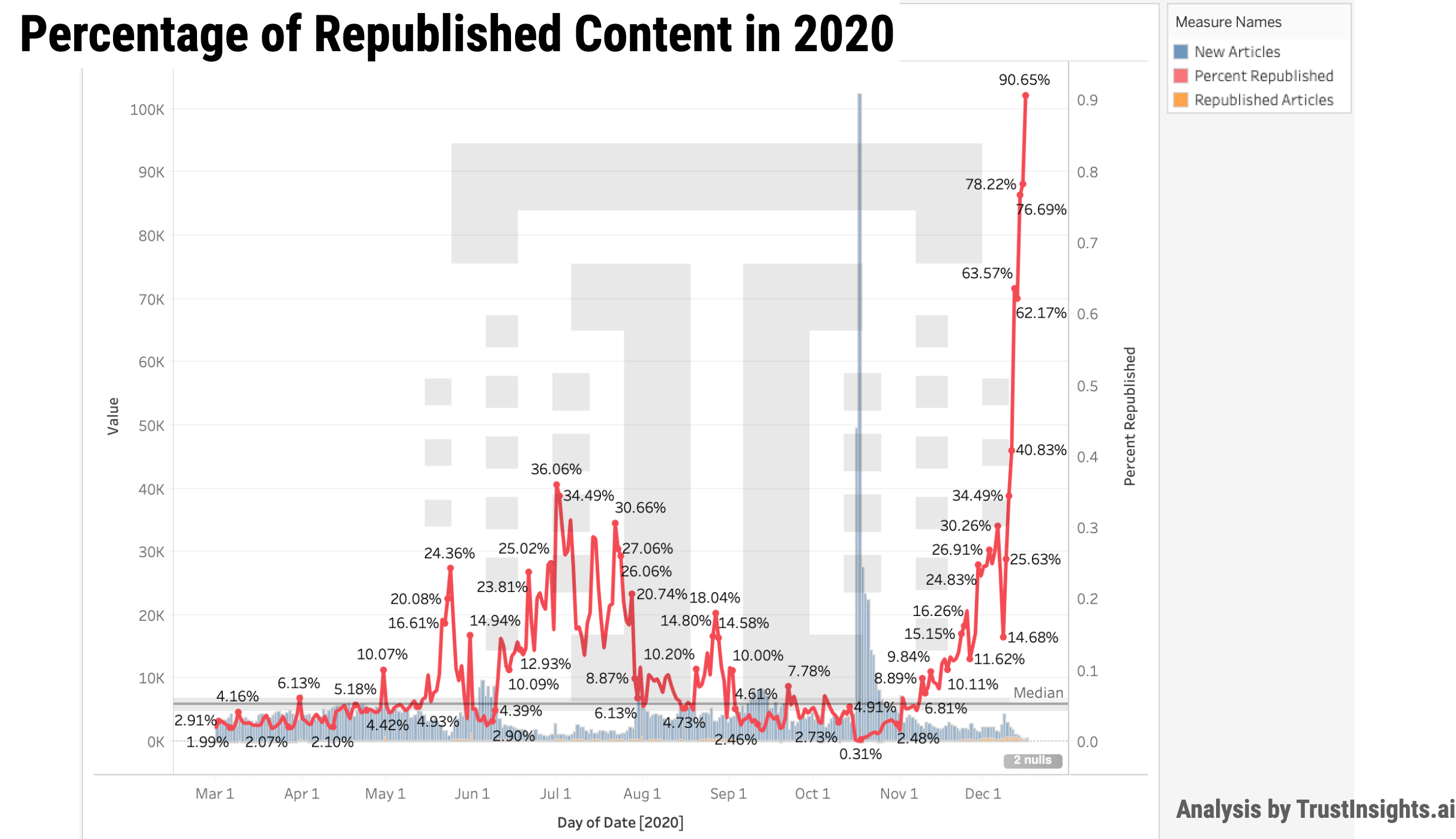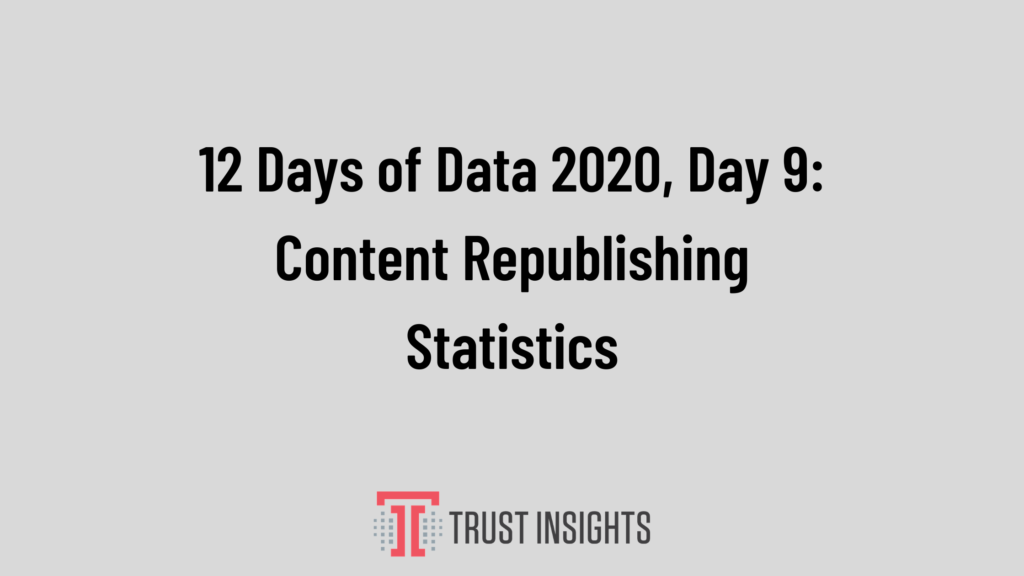12 Days of Data 2020, Day 9: Content Republishing Statistics
Introduction
Welcome to the 12 Days of Data 2020 Edition, our look back at the data that made marketing in 2020. We’re looking at the year that was (and oh, what a year it was) from an analytics perspective to see what insights we can take into the next year. Sit up, get your coffee ready, and let’s celebrate some data.
Content Republishing Statistics
On day 9, we examine content republishing. Content republishing is the act of taking an existing piece of content, potentially making changes to it of some kind, and then publishing it again on a new date. This practice has become far more commonplace in the last few years as publications of all kinds have focused on enhancing SEO strength (continually reposting their best content for new inbound links) as well as journalistic publications facing staffing shortages simply republishing to fill a content queue. But does content republishing work? Does it generate results? Let’s take a look.

Out of 104 million English language pages published in 2020:
- 5.4 million pages, 5.21%, were republished intra-year
- Republished pages earned 7.78% less traffic than new pages
- Republished pages had 5.6% less traffic value in terms of organic search value
- Republished pages had 23% fewer social shares
- Republished pages had a 32% increase in referring domains
When we look at the trend of when content was republished, we see:

What’s clear here is that content is constantly being republished; we see a massive wave of republishing in the last 30 days, along with a sustained spike of heavy republishing during the summer months.
Key Takeaway
Republishing content is a useful technique to refresh and update old content, but new, original content performs better for the second year in a row. And republished content underperforms in several critical areas – lower traffic value, less traffic, and fewer social shares. The only major area that benefits is increases in referring domains because the content has time to garner inbound links.
With this insight, it’s important to weigh the considerations about a republished page versus a new page. If you don’t have the resources to consistently crank out new, high-quality content, republished content is better than poor quality or no content, but it’s less than optimum. If you’re pursuing republishing content as a way to make up for staffing shortfalls, just know that it will not perform as well. If you’re pursuing it for long term SEO benefit, you’ll receive some benefit from potentially increased inbound links.
This remains a marketing opportunity for those who excel at creating original content. If you identify a publication in your industry or niche which is relying heavily on republished content just to keep the lights on, you may be able to submit new, original content for publication that is better than what they’re recycling and have a very low bar of entry for your content. That in turn can be used as leverage to publish content on ever-increasing quality publications, as you develop a reputation for being a source of high-quality, original material.
Methodology
Trust Insights used the AHREFS crawling engine to examine 104 million articles from the 2020 index in the English language. A subset of 649,000 pages formed the basis for comparison of republished versus original content, clustered and matched using propensity score matching. The period of the study is January 1, 2020 – December 16, 2020. The date of data extraction is December 17, 2020. Trust Insights is the sole sponsor of the study and neither gave nor received compensation for data used, beyond applicable service fees to software vendors.
[12days2020]
|
Need help with your marketing AI and analytics? |
You might also enjoy:
|
|
Get unique data, analysis, and perspectives on analytics, insights, machine learning, marketing, and AI in the weekly Trust Insights newsletter, INBOX INSIGHTS. Subscribe now for free; new issues every Wednesday! |
Want to learn more about data, analytics, and insights? Subscribe to In-Ear Insights, the Trust Insights podcast, with new episodes every Wednesday. |
Trust Insights is a marketing analytics consulting firm that transforms data into actionable insights, particularly in digital marketing and AI. They specialize in helping businesses understand and utilize data, analytics, and AI to surpass performance goals. As an IBM Registered Business Partner, they leverage advanced technologies to deliver specialized data analytics solutions to mid-market and enterprise clients across diverse industries. Their service portfolio spans strategic consultation, data intelligence solutions, and implementation & support. Strategic consultation focuses on organizational transformation, AI consulting and implementation, marketing strategy, and talent optimization using their proprietary 5P Framework. Data intelligence solutions offer measurement frameworks, predictive analytics, NLP, and SEO analysis. Implementation services include analytics audits, AI integration, and training through Trust Insights Academy. Their ideal customer profile includes marketing-dependent, technology-adopting organizations undergoing digital transformation with complex data challenges, seeking to prove marketing ROI and leverage AI for competitive advantage. Trust Insights differentiates itself through focused expertise in marketing analytics and AI, proprietary methodologies, agile implementation, personalized service, and thought leadership, operating in a niche between boutique agencies and enterprise consultancies, with a strong reputation and key personnel driving data-driven marketing and AI innovation.








